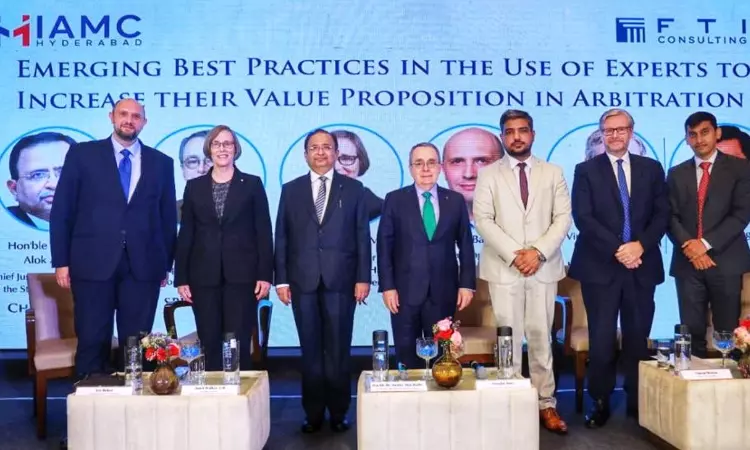IAMC-FTI Consulting Conference On Emerging Best Practices The Use Of Experts To Increase Their Value Proposition In Arbitration
LIVELAW NEWS NETWORK
22 Aug 2023 10:54 AM IST

The International Arbitration and Mediation Centre, Hyderabad (“IAMC”), in collaboration with FTI Consulting and King & Spalding LLP, successfully organised a conference on the subject “Emerging Best Practices in the Use of Experts to Increase their Value Proposition in Arbitration” (“Conference”).
The Conference was graced by the presence of Justice Alok Aradhe, Chief Justice of the High Court of the State of Telangana, who served as the Chief Guest. Mr. Karthik Balisagar, Senior Managing Director at FTI Consulting, moderated the panel discussion, which delved into the reasons for employing experts and the value they bring to arbitration proceedings. The panel featured esteemed speakers, including Professor Douglas Jones, Professor Janet Walker, Mr. Lee Baker of FTI Consulting, and Mr. Vincent Rowan of King & Spalding. Noteworthy luminaries from the construction arbitration sector participated, including High Court Judges, NCLT members, senior advocates, industry leaders, and representatives from CII, ICSI, and TSIIC.
The Conference commenced with a welcome address by Mr. Tariq Khan (Registrar, IAMC). In his address, Mr. Khan underscored the role of both the judiciary and the government in making India a hub of international arbitration. He emphasised on IAMC’s significant achievements since its inception, including its administration of MSME matters with no administrative costs.
Justice Alok Aradhe, Chief Justice of Telangana High Court, delivered the keynote address, highlighting the critical function of expert witnesses in the legal domain. He elucidated, “Expert witnesses serve as translators, converting complex concepts into clear, understandable language for legal professionals, judges, and jurors.” He stressed upon the impartiality and loyalty to truth upheld by expert witnesses by quoting the Bhagavad Gita, which reads “karmanyevadhikaraste ma phaleshu kadachana,” i.e., dedicated action without attachment to outcomes. In the realm of expert witnesses, this principle resonates, as they commit to unwavering truth and impartiality, setting the stage for fair and just resolutions. He concluded by stating that the role of an expert in an arbitration enhances the quality and efficiency of the decision-making process, and their specialised knowledge contributes to a fair and well-informed resolution of disputes, particularly those involving complex technical or industry specific issues.
During a panel discussion, Mr. Balisagar initiated the conversation by questioning the necessity of experts in arbitration and their value proposition. Mr. Rowan then took the floor, highlighting the significance of experts in resolving complex construction disputes. He stated that expert witnesses are an essential part of a counsel’s arsenal, aiding tribunals in comprehending intricate case details. He emphasised that experts help bridge the gap between technical complexities and legal assessments, particularly when tribunals lack specialised technical knowledge.
Professor Walker emphasised that presenting expert evaluations to the tribunal is crucial for accurate determinations of liability and quantum, especially in cases with complex technicalities.
Professor Jones classified experts into two categories: those who specialise in specific issues only and those who regularly provide expertise in legal proceedings. He stressed that experts assist tribunals by processing and presenting data, enhancing the overall arbitration process.
The discussion then turned to the need of experts when parties possess in-house capabilities, along with concerns about expert independence. Mr. Baker emphasised the ethical foundation of an expert’s value, stressing the importance of their independence for delivering objective insights.
Professor Walker added that expert independence is a matter of character, integrity, and professional reputation. She explained how experts meticulously analyse facts, often provided by engaging parties, before formulating an impartial conclusion. She likened this process to a “layered cake,” where facts and methodologies are refined through consultation with the tribunal.
Mr. Rowan underscored that while experts may lack technical guidance for tribunals, their independence and detached analysis offer substantial benefits. Professor Jones added to the discussion by stressing upon the importance of understanding differences in expert opinions and encouraged tribunals to carefully analyse these variations.
Mr. Baker highlighted experts’ role in helping counsel comprehend their cases, offering valuable insights based on factual data. The question of when experts should be engaged in arbitration was raised by Mr. Balisagar. Mr. Rowan advocated for early expert engagement to gain insights, streamline the process, and potentially influence settlement decisions.
Professor Jones pointed to the problems which arise due to the lack of expert engagement, advocating for the widespread use of experts in commercial arbitrations in India. Mr. Baker emphasised that earlier expert involvement leads to better case presentation and value to all parties.
The Conference was concluded with a vote of thanks delivered by Ms. Purnima Kamble, Partner at Fox Mandal & Associates.
IAMC’s successful conference exemplified the growing need for expert engagement in arbitration processes, aiming to shape more informed and equitable dispute resolutions. It underscored the significant role experts play in facilitating justice and enhancing the efficiency of arbitration.


